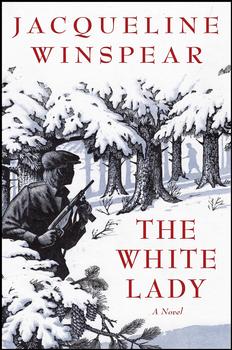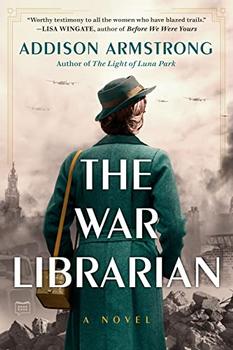Summary | Excerpt | Reviews | Beyond the book | Read-Alikes | Genres & Themes | Author Bio

A Novel
by Jacqueline WinspearJacqueline Winspear's latest, The White Lady, is a stand-alone novel featuring a new heroine. We meet Elinore White in Kent, England, two years after the end of the Second World War. She's a mystery to her neighbors, known by many as "the quiet woman" since she so rarely interacts with those she encounters. This changes when she meets Jim and Rose Mackie, and becomes entranced by their infant daughter, Susie. Elinore soon becomes aware of a threat to the young family, and she instinctively acts to protect them, in the process uncovering a dangerous criminal gang about to unleash a crime spree in London. Working with Scotland Yard, Elinore seeks to foil the plot while keeping the Mackies out of harm's way.
The primary plot is peppered with flashbacks to Elinore's past that serve to gradually reveal who this enigmatic woman truly is. Beginning with her role as a pre-teen saboteur in Belgium during the Great War, readers discover that she's acquired skills over the decades that led her to become a spy during the Second World War and explain why she's so concerned about Rose's well-being.
This type of novel is square in Winspear's wheelhouse. The women characters she creates (the most notable example being the ever-popular Maisie Dobbs) are strong, independent, and resilient, and Elinore White displays those traits in spades. The author is particularly adept at drawing protagonists who appear cold, but who are compassionate underneath their hard façade, always striving to help the underdog; again, Elinore fits the mold.
The author also excels at balancing the two plotlines that cover three significant periods in British history (WWI, WWII, and the post-war years). She has the remarkable ability to bring each to life, highlighting concerns unique to the era (e.g., the bombing of London during the war, post-war rationing). As a result, the novel is exemplary historical fiction, educating as it entertains. Winspear's prose, too, has a depth to it that raises it above mystery novels with a similar setup. As Elinore grapples with her actions during each war, it becomes clear women as well as men came home from the battlefront with deep emotional scars.
Winspear has not announced that The White Lady is the first book in a new series, referring to it as a stand-alone novel on her web site. There are, however, a number of plot-points wedged into the 1947 storyline that make little sense unless viewed as potential fodder for a sequel down the road. Indeed, this might be the novel's main flaw – parts of this thread aren't as well-developed, leaving readers with the impression that important parts of the story are missing or overly brief.
The other issue with the work is that Elinore White is in many ways similar to Maisie Dobbs (both are talented as children, they're smart and skilled, softhearted under a cool exterior, etc.). For those readers who've followed Maisie over the seventeen entries in the series, it may seem like starting it all over again before the character really had a chance to develop, leaving Elinore feeling flat in comparison. Consequently, while some fans will likely be delighted with a chance to enjoy a variation on Winspear's well-regarded heroine, others may view it more with a sense of "been there, done that."
Regardless, The White Lady features rich historical fiction and an intriguing protagonist. This fast-moving novel is sure to be a hit with many, and is recommended for most audiences, particularly those who enjoy books about the war years. It's sure to attract new fans to Winspear's works and would also make a good book group selection.
![]() This review was originally published in The BookBrowse Review in May 2023, and has been updated for the
April 2024 edition.
Click here to go to this issue.
This review was originally published in The BookBrowse Review in May 2023, and has been updated for the
April 2024 edition.
Click here to go to this issue.

If you liked The White Lady, try these:

by Kristin Hannah
Published 2024
From master storyteller Kristin Hannah, #1 New York Times bestselling author of The Nightingale and The Four Winds, comes the story of a turbulent, transformative era in America: the 1960s.

by Addison Armstrong
Published 2022
The Paris Library meets The Flight Girls in this captivating historical novel about the sacrifice and courage necessary to live a life of honor, inspired by the first female volunteer librarians during World War I and the first women accepted into the U.S. Naval Academy.
Harvard is the storehouse of knowledge because the freshmen bring so much in and the graduates take so little out.
Click Here to find out who said this, as well as discovering other famous literary quotes!
Your guide toexceptional books
BookBrowse seeks out and recommends the best in contemporary fiction and nonfiction—books that not only engage and entertain but also deepen our understanding of ourselves and the world around us.